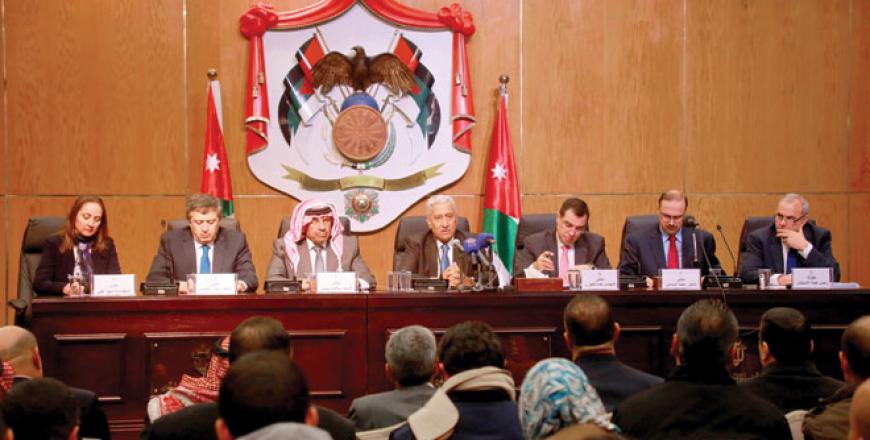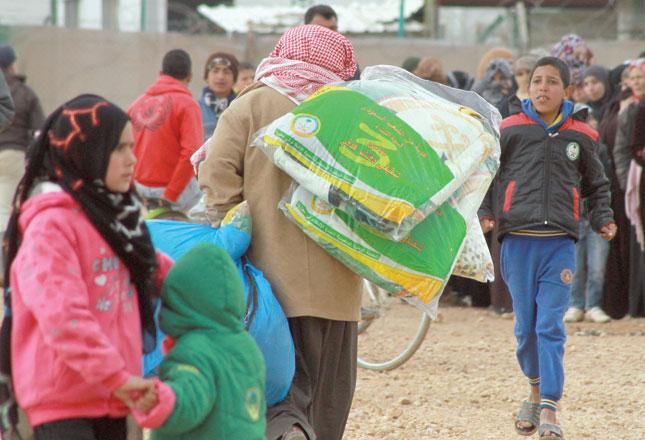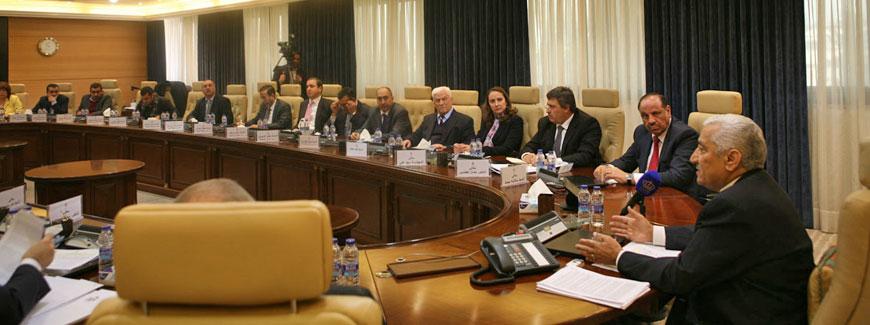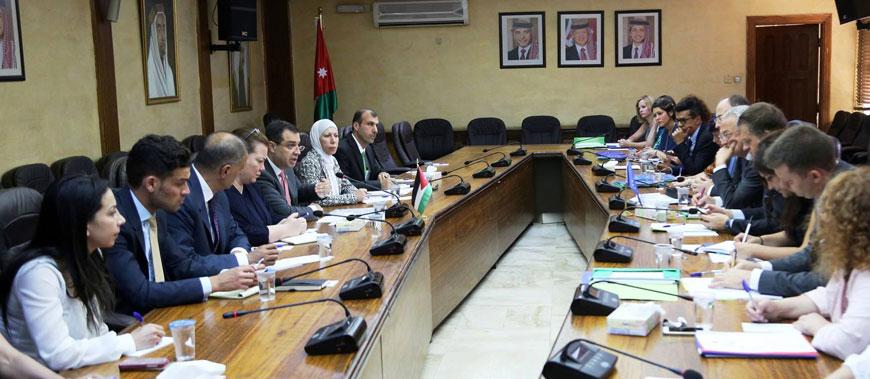You are here
Jordan succeeded in attracting world’s attention, help — PM
By Omar Obeidat , Khetam Malkawi - Feb 07,2016 - Last updated at Feb 07,2016

Prime Minister Abdullah Ensour and several members of his Cabinet hold a press conference at the Royal Cultural Centre in Amman on Sunday (Photo by Sahem Rababah)
AMMAN – Prime Minister Abdullah Ensour on Sunday said Jordan succeeded in attracting the attention of the international community to the burdens Jordanians have borne over the past five years due to the influx of Syrian refugees.
At a press conference, attended by a number of ministers, the premier said the Supporting Syria and the Region Conference, held Thursday in London, adopted Jordan's “holistic approach” to the Syrian refugee crisis that stressed the need to support the Kingdom to be able to offer decent living for both refugees and host communities.
As the Kingdom is set to receive hundreds of millions of dollars pledged by donor countries, Ensour said authorities will start to draw up programmes and strategies to provide economic opportunities for both Jordanians and Syrians.
On the details of the outcomes of the London donor conference, Minister of Planning and International Cooperation Imad Fakhoury told reporters that the holistic approach Jordan presented at the conference included three pillars.
The first component, he said, is to shore up the Jordan Response Plan for the Syrian refugee crisis for 2016-2018 by supporting host communities in the Kingdom. He indicated that donors pledged $700 million a year for 2016, 2017 and 2018 to develop services and infrastructure in the fields of health, education, water and municipal services.
The total amount of funds Jordan is expected to receive for host communities would be $2.1 billion in the coming three years, he said, adding that $1.5 billion would be spent on projects in the fields of sewage, education, health and infrastructure.
The second pillar focused on bridging the financing gap the government is facing, the minister said, adding that donors pledged to offer concessionary loans worth $1.9 billion a year until 2018, which, Fakhoury said, would be cheaper than borrowing from local banks or bonds on international financial markets.
“These cheap loans would reduce pressure on the Kingdom’s public debt and will help the country bring it to safe levels,” he added.
The concessionary funding would carry an interest rate of less than 1 per cent with a grace period of seven years or more and a payment period of up to 25 years, he explained.
In addition to soft loans, Fakhoury said donors vowed to extend grants to Jordan worth $900 million over three years.
The third pillar, according to the minister, is to streamline Syrian labour in the Kingdom by attracting investments to five development zones: Irbid, Karak, Muwaqqar, Maan and Mafraq.
This component would enable the Kingdom to create job opportunities for Jordanians in addition to Syrians, who would be legalised and organised more efficiently, and will be allowed to work in sectors that do not harm Jordanian jobseekers.
Under this pillar, Fakhoury said, the EU agreed to reconsider and simplify rules of origin on Jordanian exports for the next 10 years, describing this as a breakthrough that would generate investment opportunities in development zones and would create tens of thousands of jobs.
Fakhoury said the government would start a plan immediately in a bid to reach an agreement with the EU in the summer of this year.
As to simplifying rules of origin by the EU, Ensour described this step as the biggest achievement at the London conference as strict rules of origin imposed by the EU have limited the ability of the Kingdom’s private sector to enter the European market, noting that Jordan’s exports to the EU member states remained around $200 million a year, while imports from there exceeded $3 billion.
Fakhoury said that London conference also focused on providing education for Syrians.
There are between 80,000 to 90,000 Syrian students who have not joined schools in Jordan, Fakhoury said, adding that donors requested Jordan to help them join schools.
Donors expressed readiness to finance the cost of offering education to Syrian students, which he said would cost around $1 billion to build more classrooms and new schools to accommodate them.
On the outcome of the London conference, the minister said it is still the beginning of a journey and a positive breakthrough, adding that Jordan would “fight aggressively” to make sure the international community would keep its promises.
Related Articles
AMMAN — Prime Minister Abdullah Ensour is scheduled to hold a press conference on Sunday at the Royal Cultural Centre to explain the outcome
AMMAN – The government on Wednesday said that allowing Syrians to join the labour market would not "by any means" affect job opportunities f
AMMAN – Minister of Planning and International Cooperation Imad Fakhoury on Tuesday urged the European Union (EU) parliament to extend more


















